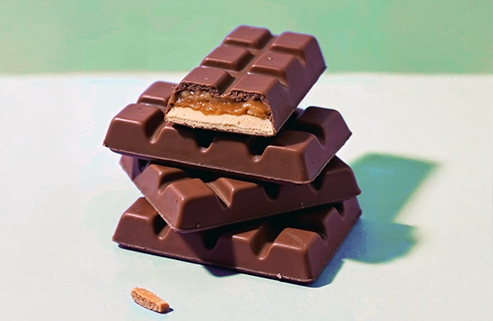The Rise of Chocolate as a Supplement Delivery Vehicle: Health, Flavor, and Innovation
In recent years, the food industry has witnessed a surprising convergence between two seemingly distinct markets: nutritional supplements and chocolate. This fusion, driven by increasingly discerning and health-conscious consumers, reflects a global demand for products that combine sensory pleasure, functionality, and a commitment to well-being. Once considered a mere indulgence, chocolate has transformed into a strategic ally for delivering essential nutrients, reducing stress, and promoting wellness, while supplements gain new formats and sensory appeal.
Cocoa, the key ingredient in chocolate, is naturally rich in flavonoids—powerful antioxidants that fight free radicals, reduce inflammation, and improve cardiovascular health. Studies confirm that moderate consumption of dark chocolate (with at least 70% cocoa) is linked to enhanced cognitive function, mood regulation, and even a reduced risk of chronic diseases. These inherent properties have paved the way for chocolate to be reimagined as an ideal platform for supplementation.
Pioneering brands like Chocolife have already incorporated ingredients such as collagen, B-complex vitamins, magnesium, and plant-based proteins into their formulations. The result is chocolate bars that not only satisfy sweet cravings but also strengthen immunity, support bone health, and even alleviate anxiety symptoms. For vegan consumers—a group that represents 14% of the Brazilian population—these innovations are particularly relevant, as many traditional supplements contain animal-derived ingredients. Fortified chocolates with iron, zinc, and vitamin B12, for example, help address common deficiencies in restrictive diets.
Cacau Show is investing in developing chocolate bars that cater to the supplement market, aligning taste, health, and functionality. Their “Bendito Cacao 70%” line features options such as “Focus,” “Skin Health,” “Vitality,” and “Immunity,” each highlighting specific wellness benefits. Additionally, a milk chocolate bar called “Energy Choc” is designed for an energy boost, reinforcing the brand’s commitment to innovating with products that combine premium ingredients with functional properties. This approach reflects Cacau Show’s dedication to meeting the needs of consumers who value products that deliver both pleasure and health benefits.
The integration of supplements into chocolate goes beyond simply adding isolated nutrients. Companies are exploring sophisticated combinations, such as chocolates infused with ashwagandha (an adaptogen known for reducing stress), probiotics for gut health, and even algae-derived omega-3. These formulations cater to specific niches: athletes seek chocolates with electrolytes and pea protein for muscle recovery, while mothers opt for fortified versions with calcium and vitamin D to support child development.
A notable example is the use of chocolate in mental health supplements. With 53% of adults reporting that stress affects their daily lives, according to the American Psychiatric Association, chocolates enriched with L-theanine (an amino acid found in green tea) and tryptophan (a precursor to serotonin) are gaining traction. The texture of chocolate itself also contributes to this effect: its smooth melting sensation in the mouth stimulates endorphin release, creating a comforting experience that goes beyond nutrition.
Incorporating supplements into chocolate is no easy task. Cocoa has intense flavors and a fatty matrix that can interfere with the stability of sensitive ingredients, such as vitamins and probiotics. Companies like Sylvestre Ingredientes Naturais are investing in technology to develop encapsulation systems that protect nutrients during processing, ensuring both efficacy and balanced flavor. Another challenge is avoiding excessive sugar: natural sweeteners like apple concentrate—Sylvestre’s Apple Sweet—offer an alternative to address this issue.
Despite the complexities, the market outlook is promising. In Brazil, 59% of households already consume supplements, and the demand for convenient and flavorful options is driving innovation. Chocolate bars with whey protein, for example, are popular among fitness enthusiasts, while those with hydrolyzed collagen attract consumers concerned about skin aging. Globally, the trend is even stronger: 56% of consumers purchase plant-based foods monthly, and fortified vegan chocolates are emerging as ethical and nutritious options.
Sylvestre Ingredientes Naturais: Innovating with Natural Ingredients for Super Chocolates
Amid this wave of innovation, Sylvestre Ingredientes Naturais stands out as a strategic supplier in this growing market. With expertise in producing soluble powder and liquid extracts, the company utilizes natural ingredients from Brazil’s exotic flora to create a creative portfolio of blends and isolated extracts. These solutions enable the inclusion of functional compounds in chocolate without compromising taste, texture, or stability. Additionally, their innovative approach ensures that ingredients maintain high bioavailability, enabling effective supplementation aligned with modern consumer demands.
The rise of supplement-infused chocolate is not happening in isolation. Consumers demand transparency, from cocoa sourcing to packaging disposal. Certifications such as Fair Trade and Rainforest Alliance provide a competitive edge, ensuring ethical cocoa cultivation free from child labor and harmful environmental practices. Packaging also plays a role: compostable and recyclable materials are a priority, as well as clear labeling on nutrient dosages and benefits.
The fusion of chocolate and supplements represents a paradigm shift in the relationship between food and health. For brands, the challenge is to balance scientific innovation with authenticity, ensuring that each bite is an act of self-care—without sacrificing the luxurious sensory experience that only chocolate can provide.


